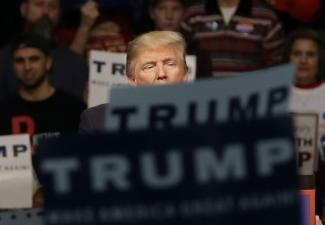Comment
Lessons from the USA

It would be too simplistic to say the election was swayed by sheer distaste of the establishment or anger among those who feel left behind. It is important to consider the dramatic underlying changes. The American middle class is shrinking because the benefits of globalisation and free trade have not been shared equally. In academic debate, there is little doubt that economies as a whole benefit from globalisation and free trade, but not every person does.
Are we seeing a growing tension between what is good for the economy in general but turns out to hurt the well-being of a significant share of the people? Obviously, many Americans feel frustration even though the USA is currently performing quite well among advanced economies. For the third quarter of 2016, 2.9 % growth was reported.
Employment matters too, of course. Jobs provide incomes, foster human dignity and contribute to self-esteem. However, US unemployment rate has not been high recently (4.9 % in October – down from 10 % seven years ago). We must therefore assume that the unemployment rate is not properly reflecting the level of individual frustration.
Perhaps it makes more sense to consider the labour-force participation rate, which includes those employed as well as those looking for a job. It has been declining. It was about 66 % before 2008, but has dropped to about 63 % currently. This could mean that some people who actually want to work have given up the hope of finding a job.
While globalisation and free trade do drive economic growth, they apparently do not ensure everyone’s well-being. There are winners and losers. Without proper compensation or a benefits redistribution mechanism, losers will be trapped in unrecoverable disadvantages. Imagine a small or medium-sized enterprise that had to shut down after having lost competitiveness due to the influx of cheap goods from abroad – owners and employees bear the brunt of income and job losses.
The US Trade Adjustment Assistance Program is supposed to provide compensation, adjustment and re-employment for the disadvantaged. It has been in place for more than 60 years, but it has only yielded mixed results.
International trade is not the only factor that affects employment opportunities. Technological advancement – especially digitalisation – is relevant too. It seems that the widening gap between national and individual well-being could explain a large part of the US election results. Apparently, discontent is deep-seated and growing. It is noteworthy, moreover, that a similar sense of anger is evident in other countries too. It is driving populist movements and contributed to Britons’ referendum vote to leave the EU.
Given that globalisation and free trade drive the growth and welfare of economies, we should not give up on them. If we want prosperous societies all over the world, we must resist protectionist pressures to raise the bars against each other. At the same time, it is certainly necessary to heal the deep wounds of large parts of society. Political leaders, scholars and international institutions must therefore do more than merely spell out the benefits of globalisation. How those benefits are shared, matters too.
Governments should therefore focus more on equitable redistribution and make targeted assistance to the disadvantaged more effective. If too many people lose out in the course of globalisation, globalisation itself may be doomed, and that would mean even fewer opportunities all over the world.
It seems that the ball is now in the court of proponents for globalisation and free trade. Whether Trump will stick to his campaign promises or take a different approach after being inaugurated, remains to be seen. Either way, however, the result of the US election seems to have left proponents of globalisation and free trade more serious homework than ever before.
Jong Woo Kang is a principal economist with the Asian Development Bank (ADB). This comment is based on a contribution he wrote for an ADB blog.
jkang@adb.org









